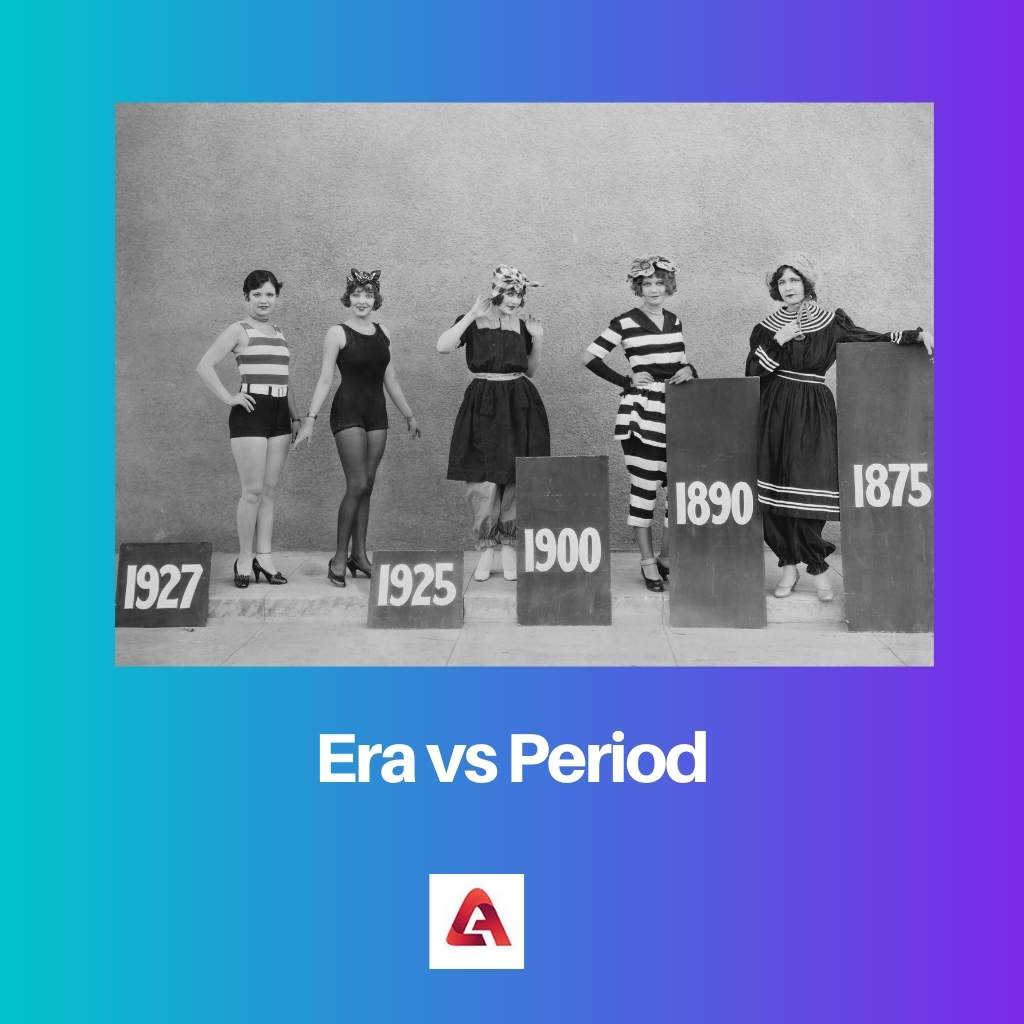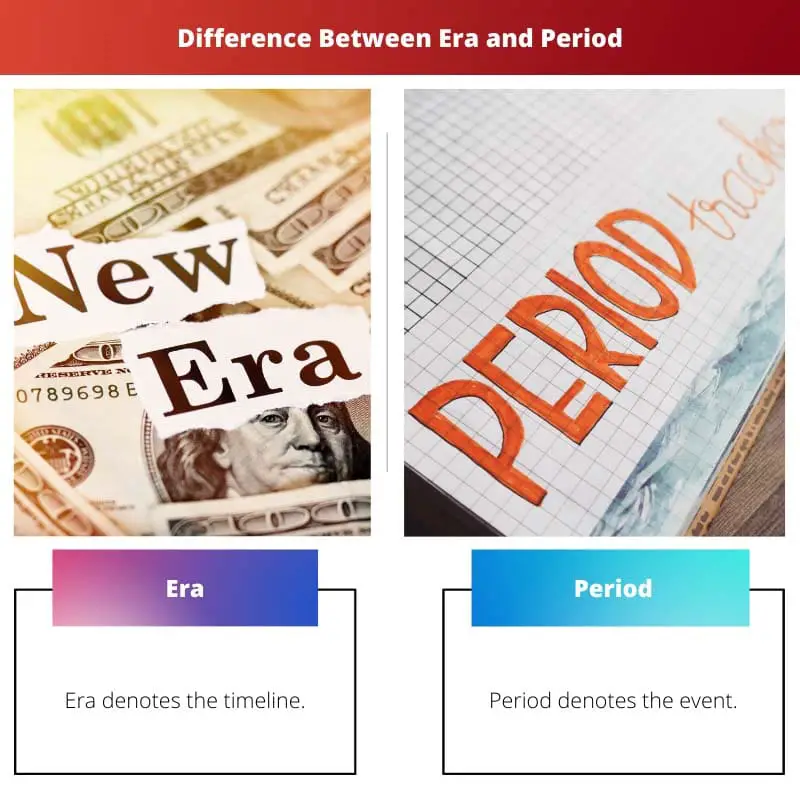Historical events and their significance is well understood only when there is a clear understanding of the blocks of time. Indeed, history denotes every happening of the past using the time factor with different terms.
These terms denote the events in a perfect sequence. The terminologies Era and Period play a notable role in this context.
Key Takeaways
- An “era” is a long period characterized by significant events or developments, while a “period” is a shorter time within an “era.”
- “Eras” describes broad historical movements, while “periods” focus on specific cultural, artistic, or scientific developments.
- “Eras” can be further divided into periods, but “periods” cannot be divided into eras.
Era vs Period
The difference between Era and Period is in the time and event factor. Era denotes the start and end time of a significant event, while Period denotes an event that necessarily does not have any specific time frame for that to have happened. That means to say, an era has specific years and dates while a period does not have it.

An era is a time that has important events happening on the earth. An era is a time frame that defines the chronological factors in history. The term era also defines a particular quality of situations that happened during that particular time frame.
History denotes the Era as incredible developments that have happened in the past.
The period is again a chunk of time in history that is large but not as large as denoted by era also denotes an important event that had happened in the past.
The term period denotes a concrete characteristic factor of the event. The period may connect the eras, too, but it does not have a definite timeline.
Comparison Table
| Parameters of Comparison | Era | Period |
|---|---|---|
| Notification | Era denotes the timeline. | Period denotes the event. |
| Terminology’s Origin | Latin – meaning Counters for Calculation | Greek – meaning Cycle of Time |
| Duration | Usually longer than Period | Usually shorter than Era |
| Time Frame | A whole time | A portion of time in an era or even eras |
| Periodization | Era cannot be changed. | The period can change if a piece of new information is discovered during the block of time. |
What is Era?
Era is the term used to denote a specific period in history. It is a lengthier time frame mostly that denotes several events that happened during that time frame. Era denotes the time frame of the event that had happened by itself.
The dictionary defines Era as ‘A Long and Distinct Period of History’.
Era is a major division of time in history that includes many events that are more significant and trivial. The term ideally denotes the period that is useful for people to understand the events in a sequence. A few examples
- Regnal Era
- Calendar Era
- Geological Era
Era defines the exact time frame. It is the longest time in a calendar era. It has a specific start and end date too. For example, An era can denote a particular dynasty that existed during a time. It can also be a mythological event that happened between two specific time frames.
The most used terminology is the calendar era. It denotes the rise and fall of an empire, the beginning of cosmic action, or even the start of a particular set of periods. Moreover, the era is very well used in history and denotes several periods.
Though the term era always denotes a longer time interval, in recent times, the term is also used to denote a few shorter periods.

What is Period?
A period is a time factor that denotes a certain significant event that happened in the past. The term period informs the event than the time frame. More importantly, the term period does not have an exact time.
It is a block of time that has a definite characteristic, unlike the ones denoted by the term era. Several ‘periods’ make an era, sometimes. The period is the term used to denote the length of time during which a particular event happened.
Examples of Period
- Victorian Period
- Period of Elizabeth
Periodization by historians is a specific activity. As the ‘era’ denotes a whole lot of events during a time frame, ‘Period’ helps to categorize the same into definite events. Several periods form an era. It may also loom large into different eras.
A period is quantified based on events. Though periods may overlap with eras, their time frame is shorter when compared with the ones notified under era. The term period is vulnerable. The duration might change if any new information is discovered.
The term period helps us to understand history more exactly than being scattered without that. It denotes the culture, tradition, wars and many other happenings within that particular time frame. More evidently, period denotes one particular event that happened during that timeline.

Main Differences Between Era and Period
- The main difference between Era and Period is the factor that the term denotes. Era denotes a time that includes a whole lot of events that are significant and less significant too. Period denotes a timeline that has a specific event that has happened.
- The era has a definite timeline structure associated with it, while the period does not have a definite timeline for a particular time.
- In history, the term era is used to mention the exact start and end time of a lengthier set of events that had happened. In contrast, period denotes one particular event that is significant that had happened in the past.
- All the events denoted in the era might not be as significant as the events denoted by the term period.
- Era is longer in time duration than Period.

- https://ixtheo.de/Record/667158162
- https://www.tandfonline.com/doi/abs/10.1080/13600829908443200?journalCode=cgsj20

The article serves as an insightful guide to understanding the differences between era and period, providing clear examples and a well-structured comparison.
The article provides a comprehensive analysis of the terms ‘era’ and ‘period’, delving into their differences and how they are characterized in history. The comparison table is especially informative.
I fully agree, Steve06. The detailed analysis in the article is very helpful.
Well said, Steve06. The comparison table brings out the distinctions clearly.
This article explains the difference between era and period, and it does so quite effectively. The examples are particularly useful, and the comparison table adds clarity to the matter.
I agree with you, Sarah86. The examples provided really help in understanding the concept.
Indeed, Sarah86. The way the article delineates the distinction between era and period is quite illuminating.
The article effectively differentiates between era and period, providing an in-depth analysis and offering a useful comparison table for clarity.
Absolutely, Dthomas. The comparison table is particularly useful for understanding the distinctions between era and period.
The article offers a comprehensive explanation of era and period, providing clarity on their distinctions and historical significance.
Absolutely, Anderson Lilly. The examples and comparison table in the article are particularly helpful in understanding era and period.
Well-stated, Anderson Lilly. The article delivers a thorough analysis of these historical concepts.
The detailed comparison presented in the article clarifies the differences between era and period, and provides essential insights into their historical significance.
I completely agree, Thompson Scott. The article serves as an excellent reference for understanding these historical concepts.
This article presents a comprehensive comparison between era and period, offering valuable insights into the historical contexts associated with these terms.
The article effectively distinguishes between era and period, providing a clear understanding of each term and its significance in historical contexts. Well-done.
I share your sentiment, Kirsten49. The article certainly does justice to the topic.
Indeed, Kirsten49. The article is a great guide for understanding these historical concepts.
The article effectively compares and explains the concepts of era and period, allowing for a deeper understanding of historical time frames and terminologies.
Indeed, Fox Carrie. The article provides a well-structured comparison that makes it easier to grasp the differences between era and period.
The article’s elucidation of the concept of era and period is a valuable resource for understanding historical time frames and the related terminologies.
Absolutely, Walker Gordon. The clarity offered in the article is commendable.